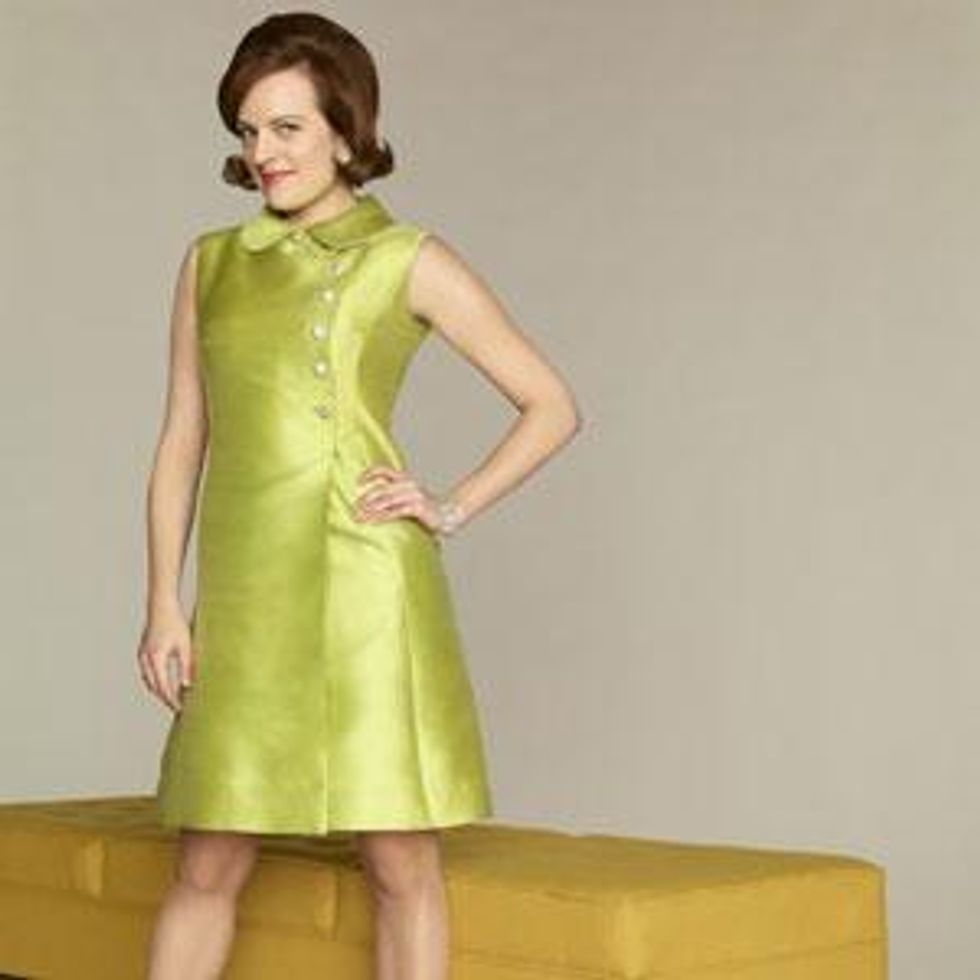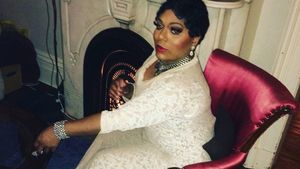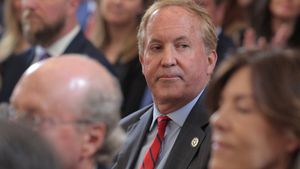We’ll buy whatever three-time Emmy nominee Elisabeth Moss is selling on AMC’s acclaimed drama Mad Men, which returns March 25 for a fifth season after a 17-month hiatus. Moss plays Peggy Olsen, an ambitious ’60s-era copywriter thriving in the male-dominated world of advertising. Next appearing in the comedy Darling Companion, which is in theaters April 20, the 29-year-old West Wing alum looks at Peggy’s lesbian leanings and shares her personal stance on gay rights as a Scientologist.
The Advocate: First of all, may I call you E.Mo?
Elisabeth Moss: [Laughs] A few friends have called me that, actually, so you’d be in good company.
Mad Men has resonated with LGBT viewers from the start. Are you aware of Peggy’s queer appeal?
The gay community’s support of Mad Men has been really awesome for us, and we’re all very appreciative. Aside from the whole style and look of the show, Jon Hamm’s appeal to men and women is pretty much a no-brainer, and it’s the same thing with Christina Hendricks. I think what appeals to the gay community about Peggy in particular is that she’s a strong, independent, feminist character, who represents the younger generation coming up in the ’60s. She has a lot of integrity, and she stands up for what’s right.
Last season Peggy befriended Joyce, a lesbian beatnik, and it seemed entirely possible that they might hook up.
Absolutely. Of course Peggy would have a really good lesbian friend, and it was fun to toy with that flirtation. I loved all the respect and kudos I got from the gay community about that storyline. People were so excited that Peggy might be a lesbian.
How close was Peggy to testing those waters?
Peggy is open to a lot of new experiences, and I loved that Peggy wasn’t put off by Joyce’s flirtation. The attention and the whole idea of it was titillating for her. I don’t think Peggy’s gay, but who knows? I mean, if anyone’s going to be gay, its Peggy.
The tension between Peggy and her adversarial office mate Joan might actually be sexual tension.
That would be really awesome, wouldn’t it? If they just totally attacked each other on top of a desk one day?
Peggy also seems intrigued with the idea of dating women when Jane Lynch hit on her in the opening sketch of last year’s Emmy Awards.
That was so cool for me, because I love Jane Lynch. Honestly, I’m such a huge fan of hers that I couldn’t even speak around her that day when she was on set. When I got that script and found out that I was going to be hit on by Jane Lynch, I could not have felt prouder or more honored.
Will Peggy continue hanging out with Joyce? Are there other gay storylines that you can tease in the upcoming season?
I can’t, really. That’s a little too specific for [series creator and executive producer] Matt Weiner’s tastes. But you need to remember that it’s the 1960s in New York City, so gay visibility is something that’s going to be more and more prevalent as time goes on.
Many gay viewers miss Sal Romano, Bryan Batt’s closeted gay art director.
I miss Bryan too, as a friend. I thought that was an incredible storyline, and I’m glad that we had it. But the truth is that what happened to Sal is what really would’ve happened: Unfortunately, he would’ve left the agency. As much as his presence on the show is missed, that was an important story to tell.
You starred as schoolmistress Martha Dobie opposite Keira Knightley in last year’s revival of The Children’s Hour, Lillian Hellman’s seminal lesbian-themed 1934 drama, in London’s West End. After a student accuses her of an impure relationship with her friend, Martha confronts her true feelings and ultimately commits suicide. What did you take away from the role?
I signed on to do The Children’s Hour because it’s a great play. I didn’t sign on to make some sort of statement, and I didn’t look at it as a lesbian story. But once I got involved in the project, I realized the impact that play had on the gay community, and I understood how much it meant to them. Gay people would tell me how excited they were, how important it was for us to tell that story, and then they’d just be in tears after the show. I ended up feeling so privileged and honored to be a part of it. The shocking and terrible thing, of course, is that the play is still so relevant today.
The press tended to sensationalize the project with headlines like, “Elisabeth Moss and Keira Knightley Play Lesbian Lovers!” Was that a surprise?
People sometimes tend to have a really small view of things, so yeah, it was kind of expected.
Is there still a chance that the production will come to Broadway?
The fact that it hasn’t transferred isn’t because of anyone’s unwillingness to do it. It’s just a matter of scheduling, because it’s difficult to bring together all those people again. It’s definitely something we all want to do, and Broadway producers are definitely interested. So we’ll see.
You earned an Independent Spirit Award nomination for playing Jessie, a pregnant Catholic teen, in Deborah Kampmeier’s 2003 drama Virgin. At one point, Jessie pursues a sexual relationship with a woman played by Daphne Rubin-Vega. How did you see Jessie’s sexuality?
I think she wanted to be loved and appreciated by anyone. That scene was really about having a sexual awakening and reconnecting with her body. Daphne’s character was very nurturing, so it was less about Jessie being gay, straight, or bi and more about her being taken care of by someone who happened to be a woman. A woman would’ve been more sensitive to Jessie’s needs, as opposed to a man.
As a Scientologist, how do you interpret your church’s stance on gay people?
One of the most important things I take from my church is the idea of personal freedom and our rights as human beings, and that includes the right to date a man or a woman. Personal freedom is a very important concept in my religion, and I translate that to sexual orientation. If we’re all supposed to have the right to the life that we want to lead, then that should apply to the gay community. There isn’t really any dogma or scripture, yes or no, right or wrong on that particular subject in my church. It’s more open to personal interpretation, and that’s my interpretation.
More on next page...
\\\
(continued)
Is it fair to say that your church’s stance on homosexuality is misunderstood by the media?
Many of my church’s stances and concepts are grossly misunderstood by the media. It’s a long list.
Growing up as a child actor with musician parents in Los Angeles, you must have been exposed to gay people from a young age.
Yeah. Being a ballet dancer for many years, I was surrounded by gay men. My first exposure to the gay community was probably when I couldn’t find a straight guy to date. [Laughs] I was lucky to be a part of a very artistic, progressive community, so I’ve never really seen the distinction between gay people and straight people. I’ve always been around gay people, so it’s never been a big deal.
One of your most notable roles as a child actor was as Baby Louise opposite Bette Midler in the 1993 television adaptation of Gypsy.
Isn’t that cool? Few people put that together, because I was, like, 9 or something. Bette Midler is an idol of mine, and I think she’s extraordinarily genius in every way. It’s an honor to even be mentioned in the same paragraph as Bette Midler. I mean, she’s Bette Midler. She just walks into a room and fills it, and even as a kid, you could feel that. Playing Baby Louise with Bette Midler was a very big deal for me.
You can’t imagine what some people would give to have Bette Midler yell “Sing out, Louise!” at them.
[Laughs] I know! I’ve never thought about it like that, but you’re totally right.
You made your Broadway debut in the 2008 revival of Speed-the-Plow as Karen, a role previously played on Broadway by Madonna. I’m pretty sure that also earns you extra gay brownie points.
I did not know that, but that’s probably the coolest thing I’ve ever heard. When I got that part, I never thought I’d be following in the footsteps of Madonna in any way, shape, or form. Just to occasionally be in the same sentence as her is an honor, so I will gladly mooch off of her gay icon status.
Who’s your celebrity girl crush?
Gosh. Oh, that’s so easy! I don’t even know why I paused. Marion Cotillard. To me, she’s just a perfect, lovely, French little fey, but she doesn’t lose her animal sexuality, and she’s still very much a woman.
You’re currently shooting Top of the Lake, Jane Campion’s BBC miniseries, in New Zealand. Your costar Lucy Lawless was recently arrested for protesting on an oil rig with Greenpeace activists. Are you staying out of trouble down there?
Yeah, I’m surprised that she didn’t call me to come be a part of her oil rig antics. [Laughs] She’s pretty badass, but she’s so sweet.
You star as a detective searching for a missing girl. Is the miniseries inclusive of LGBT characters?
Yes, but I can’t tell you about it, because it’s kind of a reveal that’s a plot point. It would ruin it if I told you.
You also costar in the upcoming film adaptation of Jack Kerouac’s On the Road as Galatea Dunkel, whose real-life counterpart was Helen Hinkle. What can you tell us about the character?
The interesting thing about Galatea is that she’s actually one of the only people in the book and in the film who’s actually outside of that whole world and sitting in judgment of it. She’s the put-upon wife who’s sort of left at home while these guys go out and have this fantastic time. There’s so much fun, experimentation, and freedom in the story, but what was interesting about playing my character is that she gets to step in with a voice of reason, like, “I’m so glad you guys are all having such a great time, but you actually do have a life and responsibilities that you’ve left behind.” I kind of liked being the person who gets to say that, because somebody needs to.
Diane Keaton and Kevin Kline play your parents in the upcoming comedy Darling Companion. Does it get any better than that?
No, actually, it really doesn’t get better than that. The two of them are idols of mine. Kevin is just the sweetest, most talented, lovely person, and Diane is just so fucking cool and funny. It was the coolest thing ever.
You’ve had many years of success in television, film, and theater. But because of your appearance in a popular commercial, how often does someone come up and ask if you have an Excedrin?
[Laughs] Way more than I would like. Just to put it out there: No, I don’t have any on me.
Follow SheWired on Twitter!
Follow SheWired on Facebook!
































































































































